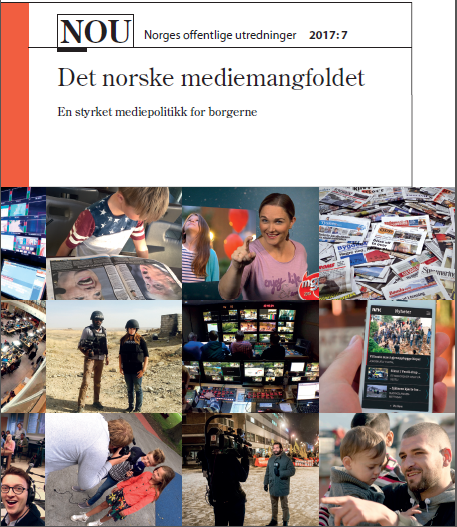Search
News categories
Norway: Media Pluralism Commission delivers its report
Norway: Media Pluralism Commission delivers its report
 On 7 March 2017, the Media Pluralism Commission presented to Norwegian Minister of Culture Linda Hofstad Helleland its report “Norwegian media pluralism – A stronger media policy for the public”.
On 7 March 2017, the Media Pluralism Commission presented to Norwegian Minister of Culture Linda Hofstad Helleland its report “Norwegian media pluralism – A stronger media policy for the public”.
The Commission proposed various changes to current media policy instruments, and put forward various new measures. Most of the measures apply for an initial four-year period, and the Commission has emphasised the need to evaluate the measures before deciding if they should be continued.
Independent, editorial news media are experiencing extensive changes due to technological developments, global competition and changes in media usage. Established business models are failing to provide sufficient income. The Commission believes there is a significant risk that journalism that is essential for the public discourse, may diminish before sustainable business models are developed. The Commission therefore proposes a number of new initiatives and schemes:
-
The ownership of public service broadcaster NRK should be transferred to an independent foundation. Moreover, the Commission proposes that the NRK's obligation to promote media diversity and to make its archives available should be reviewed regularly, for example in connection with the process that is to be carried out every four years in order to determine the NRK's income, the public broadcaster's impact on commercial media and the overall provision of media content to the public.
-
The exemption from VAT be extended to encompass all news and current affairs media. This means that media that cover a limited range of news, but cover these areas in depth, should also be included. The VAT-exemption should also apply to the purchase of single articles from publications that already are VAT-exempt.
-
A time-limited exemption from employer’s national insurance contributions for news-focused Norwegian media companies.
-
Retention of production grants for news media, albeit with several adjustments: local media receive a minimum grant of NOK 750,000; the grant rate for "number two newspapers" in cities (not the national, opinion-forming newspapers) will be replaced by the rate for local number two media. The change will be phased in over four years; the grant ceiling will be reduced to 27% of a recipient’s operating costs. The change will be phased in over four years.
-
The Commission has also proposed three new grant schemes: NOK 30 million per year to support news media innovation projects ; NOK 20 million per year to promote journalism of societal importance; NOK 20 million per year for news media that are free for users
-
The government should submit every four years a report to the Storting (The Norwegian Parliament) reviewing media policy objectives and instruments in the light of recent media developments.
The Media Pluralism Commission submitted an initial report on commercial broadcasting in October 2016 in which it concluded that, if the State still desires a commercial public service broadcaster based outside Oslo, there is a need for new instruments.
The Norwegian Government appointed the Media Pluralism Commission in September 2015, with a mandate to evaluate what the State’s media pluralism objectives should be and to examine the totality of Norwegian media output with particular focus on two areas: the function of news and current affairs media and the media in general in disseminating news and debate, as well as the impact of public service broadcasters on Norwegian language and culture. Based on this analysis, the Commission was asked to make proposals as to the focus of State fiscal policy instruments in order to promote open, informed public debate and diverse media output.
Source: Norwegian Ministry of Culture Website
Attached Documents
Countries
See also
- French CSA : public consultation on the implementation of law on media freedom, independence and pluralism posted on 21 March, 2017 01:00
- Media concentration in Flanders in 2016: VRM report posted on 10 April, 2017 02:00
- Fake news: Norwegian NMA publishes survey posted on 18 April, 2017 02:00
- Assessing Media Pluralism in Europe: MPM2016 results published posted on 06 June, 2017 02:00
- NRK contributes positively to media plurality in Norway according to NMA posted on 12 April, 2018 02:00